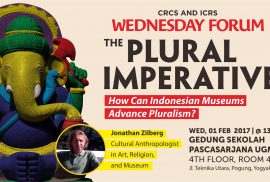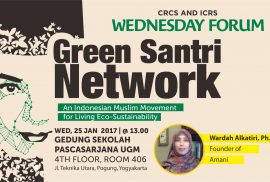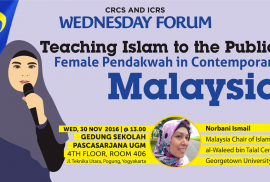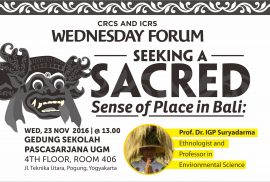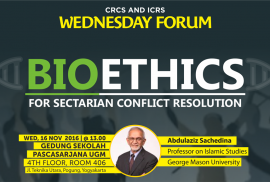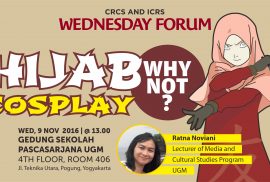
Abstract:
In this discussion, Jonathan Zilberg will discuss problems fracing Indonesian museum in terms of performance, accountability and transparency. He will discuss the Goverment of Indonesia’s 2010-2014 museum revitalization program, the transformations that have been taking place in Indonesia museum over the last decade and the challenges posed for the future. He will look at museums as democracy machines and as postcolonial centers for advacing the ideology of pluralism in civil society. In particular he will address the integrated importance of museums, adchives and libraris for advacing the state of education at all levels including for countinuing adult education.
Speaker:
Jonathan Zilberg is a cultural anthropologist specializing in art and religion and in museum ethnography. He has been studying Indonesian museums for a decade and is particularly interested in museums as democracy machines and as post-colonial centers for advancing the ideology of pluralism in civil society. His immediate interests focus on Hindu-Buddhist heritage including the function of archaeological sites as open air museums as well as of museum collections and government depositories in terms of being under-utilized academic resources. For comparative purposes, he has studied museums in Aceh, Jambi, Jakarta and to a lesser extent observed select museums elsewhere in Indonesia. Currently he is CRCS UGM Visiting Scholar.
Wednesday Forum News

Abstract:
The Green Santri Network aims to be a socio-ecological movement by Indonesian Muslim groups, using Muslims’ own sensibility and ‘thought language’ to effectively disseminate messages about Islamic ecological values for survival and sustainability and to advance the idea of relocalization, or returning to a smaller scale, as self-reliant communities with simpler ways of living and with self-local governance. It comes out of my research into how Indonesian Muslim groups, including both the large-scale Muhammadiyah and Nahdlatul Ulama and two examples of green intentional communities, Hidayatullah and An-Nadzir, can contribute toliving knowledge transmission or murabbias a way to make sustainability education relevant in the Islamic symbolic universe in the Indonesian context,based on the understanding that more than intellectual ability is needed to comprehend this knowledge; it must be made personal by living it.
Speaker:
Wardah Alkitiri earned her Ph.D. in Sociology at the University of Canterbury, New Zealand, in 2016. Her dissertation was entitled “Muhammad’s Nation is called “The Potential for Endogenous Relocalisation in Muslim Communities in Indonesia”. She is founder of AMANI, a not-for-profit organization that aims to promote ecological sustainability through entrepreneurial creativity in Jabodetabek and Central Java.

Abstract:
During the past two decades, Malaysian Muslim female preachers have gained access to opportunities and spaces to preach Islam to the public. Their preaching activism, both through the mass media and from public pulpits, is seemingly an indication of a shift in religious authority in contemporary Islamic discourse in Malaysia. They have gained trust from the public and become authoritative voices of Islam through acquiring knowledge of the fundamental texts of Islam as well as required skills such as Arabic language, memorization of religious texts and public speaking. Just like the male preachers, they have dedicated themselves to creating a sound moral and ethical society based on Islamic framework. They preach to the public on various issues, including moral-spiritual endeavors, socio-religious advice and practices, and marital and family relations. One vents based on the Islamic calendar. Nevertheless, the female preachers have to navigate their activism within the confines of social norms and of the highly-bureaucratized religious authority and administration. By adhering to social expectations and religious orthodoxy, the female preachers are able to continue preaching to the public, as well as to build trust with both the established religious authorities and the public.
Speaker:
Norbani Ismail is the Malaysia Chair of Islam in Southeast Asia at Georgetown University’s Prince al-Waleed bin Talal Center for Muslim-Christian Understanding, School of Foreign Service. She has a PhD in Islamic Studies from the International Islamic University Malaysia and is currently working on a book monograph that explores twentieth-century interpretations of the Qur’an in Indonesia and Egypt. Her research interests include Muslim women’s religious activism in Malaysia and trends in Islamic reform in contemporary Malaysia.

Abstract:
Every tradition in the world employs symbolism, but symbolism reaches acme in Hinduism. However, modern communities seem to be missing the meaning of symbolism. Most of Indonesian ethnicities, especially the Balinese, hold certain views about reality of the world, including the interconnection between the reality of the world and metaphysical world, setting aside days and ceremonies to honor plants, animals, and even inanimate objects have extrinsic and intrinsic value of sacredness. Balinese Hindus are very practical in their religion, striving for the realization of God in daily life, creating oneness and unity with all life on our physical plane and seeking to become sources of light and ambasador of peace.
Speaker:
Prof. Dr. I Gusti Putu Suryadarma is an ethnologist and professor in environmental sciences. He earned his PhD at Bogor Agricultural University on Natural Resources Management. Currently he teaches at Faculty of Mathematics and Natural Science, Yogyakarta State University.

Abstract
Although secular bioethics avoids any entanglement with religious issues, bioethics has the goal of advancing the relationship between the physician, the patient and the patient’s family in medical practice and research, even in tense moments of disagreements in the clinical situation. My involvement in Islamic bioethics, which asserts principles like asserting that bio-ethical principles like “No harm, no harassment” and maslaha or public interest, makes me confident in asserting that two universal principles, which are already operative in the healthcare institutions around the world, can establish peaceful coexistence between members of various communities. These are the value that demands acknowledgment of human equality based in inherent human dignity and the value that teaches humans to relate to one another in sincerity, sensitivity, and a deep sense of sacrifice. I argue they must be applied across all levels of interpersonal relations and interactions.
Speaker
Abdulaziz Sachedina, Ph.D., is Professor and IIIT Chair in Islamic Studies at George Mason University in Fairfax, Virginia. Dr. Sachedina, who has studied in India, Iraq, Iran, and Canada, obtained his Ph.D. from the University of Toronto. He has been conducting research and writing in the field of Islamic Law, Ethics, and Theology (Sunni and Shiite) for more than two decades. In the last ten years he has concentrated on social and political ethics, including Interfaith and Intra-faith Relations, Islamic Biomedical Ethics and Islam and Human Rights.
Abstract
The Islamic Otaku Community (IOC) is an Islamic fan-based community, which encourages young Muslims—male and female—who are actively engaged in otaku fandom to stay committed to Islamic norms and values. Hijab Cosplay can be perceived as a unique site which brings together two worlds, the sacred/ascetic activities of being a Muslimah and the secular/hedonistic activities of the otaku, in which young Muslimah not only choose, appropriate and reproduce characters from Japanese anime, manga and games, but also (re)claim their femininity as Muslimah in relation to it. In this talk, I aim to discuss how Muslim femininity is remediated through the practice of hijab cosplay, which is posted and circulated on the IOC fansite, and how the female dressed body as a mediation of femininity is actively mediated in another medium. Since the goal of remediation is to refashion or reform the earlier version of the medium, I consider the ways in which young Muslimah attempt to refashion and reclaim Muslim femininity through fandom practices. Since cosplay is not confined to the act of costuming, but is also immersed in wider fan practices, I also look at the remediation of Muslim femininity in Islamic Mangaka (fan arts and fans writing produced and posted by IOC members).

